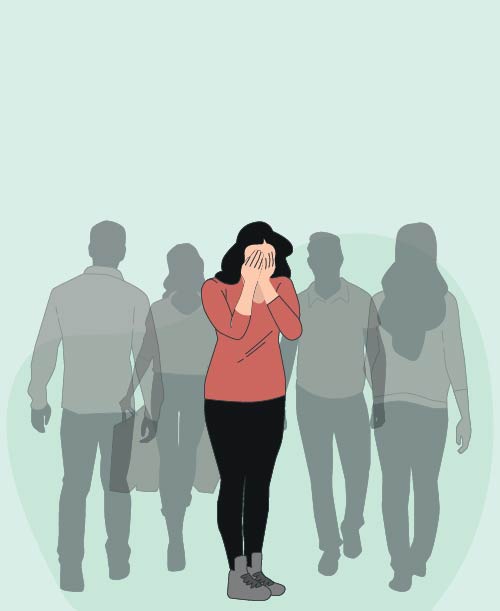

The DOs and DON'Ts of Coping with Social Anxiety
Millions of people around the world experience symptoms of social anxiety. In this article, get to learn about some tips and tricks on how to cope with social anxiety to make life easier and more fulfilling. Read on.
What is Social Anxiety?
Social anxiety disorder, also known as Social Phobia is the intense fear of being humiliated in public and is characterized by extremely self-conscious feelings in everyday social situations.
People with social phobia have a strong fear of being watched and judged by others, and are typically extremely shy, and have difficulty facing social situations - like public speaking, eating and drinking in front of others, and talking to people, especially strangers.
DO's - how to handle Social Anxiety
Listed below are some of the handiest and most beneficial tips on how to cope with social anxiety:
● Practice Relaxation Exercises
Learn and practice relaxing breathing techniques. This is one of the most effective ways of how to cope with social anxiety. When you feel overly stressed due to social anxiety, just step back and breathe until you feel calmer.
● Perform a good deed for someone
This is a good way to take the edge off being in a social situation and distract your-self from all the worries and negative thoughts by doing something nice for someone else. Once you start doing this, gradually you will see a noticeable improvement in your condition.
● Confront your fears
It is far better to face social anxiety face-on, through gradual exposure to increasingly complex social situations. The goal of the social mishap exposures is to purposely violate the [person’s] perceived social norms and standards to break the self-reinforcing cycle of fearful anticipation and subsequent use of avoidance strategies.
● Reframe your thoughts
Another top coping strategy for social and other forms of anxiety is to try and reframe your understanding of the stress you are experiencing.
● Do receive Psychotherapy
Cognitive behavioral therapy is a type of psychotherapy that is popular for treating social anxiety. It teaches the patient a different way of thinking and behaving in social situations in order for them to feel less fearful and anxious.
● Do Consider medication
Anti-anxiety medication can be effective in treating social anxiety.
● Do Exercise
Exercising for around 30 minutes a day (or at least five times a week) has also been known to reduce stress, improve mood, and increase energy. Yoga, walking, and swimming are all excellent low-impact workouts that are effective in combating anxiety.
DON'Ts - how to avoid the common mistakes
● Don’t leave it untreated
Symptoms tend to get worse if left untreated, so it is important to see a doctor if you think you have social anxiety. Doctors will be able to properly diagnose you and determine which treatment option is best for you.
● Don’t be ashamed
It is crucial to remember that you are not alone in experiencing social anxiety. Social anxiety is a common disorder, and there are millions of others dealing with the same condition.
● Don’t think you are alone
There are support groups for social anxiety that can be very helpful. While talking to a group of strangers may seem intimidating, it can be a useful resource because people in these groups share similar experiences and offer advice.
● Don’t push yourself too hard
You may want to give in to the pressure or trivialize your fears, but don’t make that mistake. Remember that if you push yourself too hard and too fast, it can make your anxiety get even worse.
● Don't hide behind your phone
Getting busy with your smartphone to avoid making eye contact with others or having to talk to them, is a common coping mechanism for people with social anxiety. However, this is the wrong approach and the more you turn to your phone, the more deeply you get dragged inside the dark corners of your mind. Rather, look to face your fears and interact with the people around you to ease your anxiety.
● Don't rely on negative coping methods
Do not rely on negative coping methods like getting drunk or smoking up, just to relax your mind. These methods may offer a short-term remedy but will prove to be very harmful and unprofitable in the long run.
● Don't embrace your negative thoughts
It’s the negative thoughts that trigger the anxiety. So, talk back at your negativity and keep affirming yourself that you’re wonderful as you are, and it’s all in your power to try to do better.
Conclusion
Social anxiety makes you withdrawn and uncomfortable in public, and you try to avoid social gatherings which can even affect your relationships. Follow the above-mentioned dos and don’ts and help yourself or your loved ones cope with this disorder with greater confidence.
Sources
https://www.medicalnewstoday.com/articles/326211
https://www.webmd.com/anxiety-panic/tips-for-living-with-social-anxiety
https://www.mayoclinic.org/diseases-conditions/social-anxiety-disorder/symptoms-causes/syc-20353561
Disclaimer: This blog provides general information and discussions about health and related subjects. The information and other content provided in this blog, website or in any linked materials are not intended and should not be considered, or used as a substitute for, medical advice, diagnosis or treatment. Kindly contact your Doctor before starting a new medicine or health regime.
Related Articles
How To Help A Friend Suffering From Anxiety Or Depression?
How Social Media Affects Your Mental Health And Leads To Anxiety
Eco Anxiety – Understanding The Problem And Dealing With It
5 Safe Remedies To Cure Anxiety Without Medication
Published on September 28, 2022

















 Health Insurance
Health Insurance  Travel Insurance
Travel Insurance  Car Insurance
Car Insurance  Cyber Insurance
Cyber Insurance  Critical Illness Insurance
Critical Illness Insurance
 Pet Insurance
Pet Insurance
 Bike/Two Wheeler Insurance
Bike/Two Wheeler Insurance  Home Insurance
Home Insurance  Third Party Vehicle Ins.
Third Party Vehicle Ins.  Tractor Insurance
Tractor Insurance  Goods Carrying Vehicle Ins.
Goods Carrying Vehicle Ins.  Passenger Carrying Vehicle Ins.
Passenger Carrying Vehicle Ins.  Compulsory Personal Accident Insurance
Compulsory Personal Accident Insurance  Travel Insurance
Travel Insurance  Rural
Rural